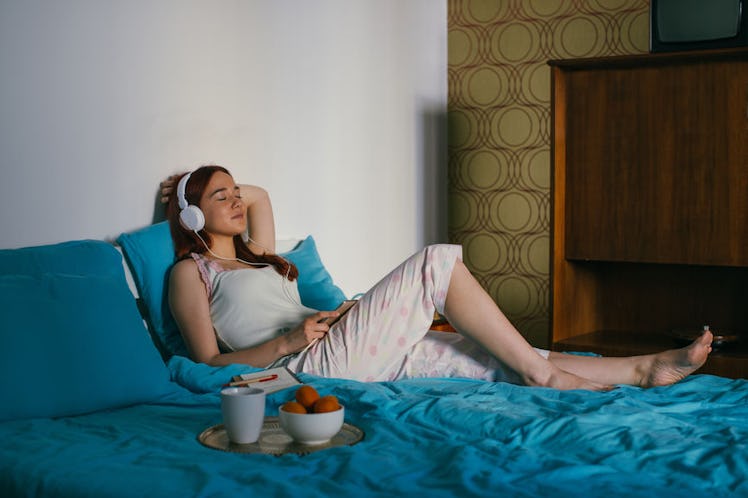
No One Tells You That Your Fave Foods Affect Your Sleep This Much, But They Totally Do
It's not exactly breaking news that drinking a cup of coffee before bed will keep you awake throughout the night, while a hot mug of chamomile tea will probably have you sleeping like a baby in no time. But how your diet affects your sleep overall might be something you're a little less familiar with, since there are definitely foods that promote restfulness in the body and keep your sleep cycle on-track, just like there are foods that don't look out for your sleep health quite as much. So how can you tell the difference between the two when you're reaching for a nighttime snack?
First, you have to understand the relationship between your sleep and your appetite, and according to Leslie Fischer, founder of Sustainable Slumber, these two things feed (pun totally intended) off of one another. "One hormone, ghrelin, signals your body that it is time to eat," Fischer tells Elite Daily over email. "Sleep-deprived people make more ghrelin, which can make you hungry even if you don't need to eat."
On the other side of this is a different hormone called leptin, which Fischer says helps you figure out when you feel full after a meal. "Sleep-deprived people have low levels of leptin, which can lead to overeating," she explains. That all makes sense, right?
Now, as for the actual foods that aren't very kind to your sleep schedule (aside from the obvious ones like sugar and caffeine), Susan Schenck, an acupuncturist, nutrition expert, and author of the book The Live Food Factor, says it's best, in the evening at least, to avoid anything that has a protein called lectin in it. According to Healthline, lectins are found in various animal- and plant-based foods, but "humans are unable to digest lectins, so they travel through your gut unchanged." So it's not really that lectin is "bad" for you, but it's harder for your body to digest, and that extra work can keep you awake when all you want is some shut-eye.
"[Foods with lectin] include grains, beans, nightshades [tomatoes, potatoes, and eggplants, for example], and more," Schenck tells Elite Daily over email. "These will bloat you with gas, diminishing your capacity to sleep." And, if you really can't help but eat some of these foods close to bedtime, Schenck recommends preparing them in a pressure cooker, which can apparently "deactivate" the lectins.
As a general rule when it comes to your diet and your sleep schedule, Schneck says you should try to stop eating any large meals about four hours before you go to bed, because the digestion process can keep you from falling into a deep enough sleep, she explains.
On the bright side, there are foods that can actually benefit your sleep health instead of sabotage it. According to Dr. Fran Walfish, a psychotherapist based in Beverly Hills, California, foods with tryptophan, which is a natural calming agent and mood stabilizer (you know, the stuff in your Thanksgiving turkey that makes you pass out on the couch after dinner), are great to add to your diet. "Tryptophan occurs naturally in certain foods, such as fish, whole grains, almonds, and eggs," she tells Elite Daily over email. "You can use them in your evening meal to help you sleep."
And while tryptophan does naturally make an appearance in the foods Dr. Walfish listed, the psychotherapist also suggests eating more tryptophan-heavy foods in the evening hours before your bedtime, such as milk, turkey, cheese, yogurt, or even a big bowl of oatmeal. In fact, the oats in your oatmeal, Walfish explains, can help your body produce more melatonin, a hormone that promotes sleep. What's more, you can slice up some bananas to add to the bowl, which are also high in melatonin, as well as magnesium, another sleep-promoter and muscle-relaxant, the psychotherapist says. Add some magnesium-packed almonds or pumpkin seeds on top, and you're ready for a quality snooze, my friend.
Bottom line: Your diet and your sleep health definitely influence each other, but it's up to you to ensure that the relationship is truly harmonious. If you need me, I'll be going in on some oatmeal, y'all.